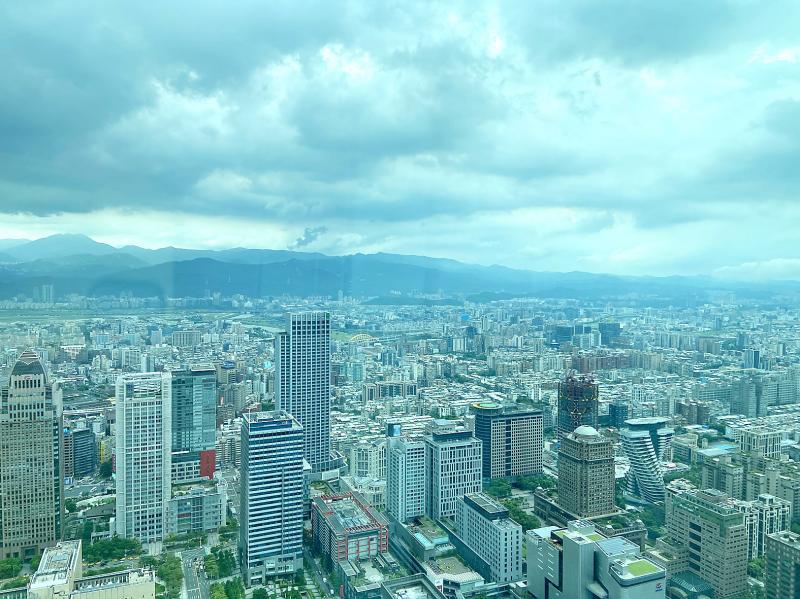Life insurance companies in Taiwan increased their combined property investments by NT$128.8 billion (US$4.46 billion) to NT$1.34 trillion in the first eight months of this year, data compiled by the Financial Supervisory Commission (FSC) showed on Tuesday.
The increased investment by life insurers for the whole of this year is expected to hit a new record, compared with the previous high in 2012, when life insurers added NT$111.8 billion in new property investment, FSC data showed.
That prompted the FSC in 2013 to implement tighter regulations on real-estate investment by life insurers to curb an overheated market.

Photo: Hsu Yi-ping, Taipei Times
This year, the advance property investment came as insurers sought targets with better returns amid low interest rates and volatility in global financial markets, the commission said.
Among the new investments in the January-to-August period, NT$50.6 billion, or 39 percent, were in superficies, while the remaining funds were put into land, commercial buildings, hotels and build-operate-transfer (BOT) projects, it said.
Major deals included Nan Shan Life Insurance Co (南山人壽) winning superficies rights to a plot of land in Taipei’s Xinyi District (信義) for NT$31.28 billion and Fubon Life Insurance Co (富邦人壽) acquiring Sunworld Dynasty Hotel Taipei (王朝大酒店) for NT$25.52 billion, the data showed.
Life insurers pursue property investment for stable, predictable and long-term returns that help match their liability, as they provide long-term policies, the commission said.
As of the end of August, insurers’ combined property investment was 4.77 percent of their working capital, far below the regulatory ceiling of 30 percent, the commission said.
For this quarter, life insurers are expected to continue investing in properties, after Cathay Life Insurance Co (國泰人壽) last week announced that it won a BOT contract for a new facility in National Taipei University with an annual royalty of NT$1.67 billion.
Shin Kong Life Insurance Co (新光人壽) on Tuesday announced it had won a BOT contract for Nangang Bus Station for NT$610 million.

With an approval rating of just two percent, Peruvian President Dina Boluarte might be the world’s most unpopular leader, according to pollsters. Protests greeted her rise to power 29 months ago, and have marked her entire term — joined by assorted scandals, investigations, controversies and a surge in gang violence. The 63-year-old is the target of a dozen probes, including for her alleged failure to declare gifts of luxury jewels and watches, a scandal inevitably dubbed “Rolexgate.” She is also under the microscope for a two-week undeclared absence for nose surgery — which she insists was medical, not cosmetic — and is

CAUTIOUS RECOVERY: While the manufacturing sector returned to growth amid the US-China trade truce, firms remain wary as uncertainty clouds the outlook, the CIER said The local manufacturing sector returned to expansion last month, as the official purchasing managers’ index (PMI) rose 2.1 points to 51.0, driven by a temporary easing in US-China trade tensions, the Chung-Hua Institution for Economic Research (CIER, 中華經濟研究院) said yesterday. The PMI gauges the health of the manufacturing industry, with readings above 50 indicating expansion and those below 50 signaling contraction. “Firms are not as pessimistic as they were in April, but they remain far from optimistic,” CIER president Lien Hsien-ming (連賢明) said at a news conference. The full impact of US tariff decisions is unlikely to become clear until later this month

GROWING CONCERN: Some senior Trump administration officials opposed the UAE expansion over fears that another TSMC project could jeopardize its US investment Taiwan Semiconductor Manufacturing Co (TSMC, 台積電) is evaluating building an advanced production facility in the United Arab Emirates (UAE) and has discussed the possibility with officials in US President Donald Trump’s administration, people familiar with the matter said, in a potentially major bet on the Middle East that would only come to fruition with Washington’s approval. The company has had multiple meetings in the past few months with US Special Envoy to the Middle East Steve Witkoff and officials from MGX, an influential investment vehicle overseen by the UAE president’s brother, the people said. The conversations are a continuation of talks that

CHIP DUTIES: TSMC said it voiced its concerns to Washington about tariffs, telling the US commerce department that it wants ‘fair treatment’ to protect its competitiveness Taiwan Semiconductor Manufacturing Co (TSMC, 台積電) yesterday reiterated robust business prospects for this year as strong artificial intelligence (AI) chip demand from Nvidia Corp and other customers would absorb the impacts of US tariffs. “The impact of tariffs would be indirect, as the custom tax is the importers’ responsibility, not the exporters,” TSMC chairman and chief executive officer C.C. Wei (魏哲家) said at the chipmaker’s annual shareholders’ meeting in Hsinchu City. TSMC’s business could be affected if people become reluctant to buy electronics due to inflated prices, Wei said. In addition, the chipmaker has voiced its concern to the US Department of Commerce